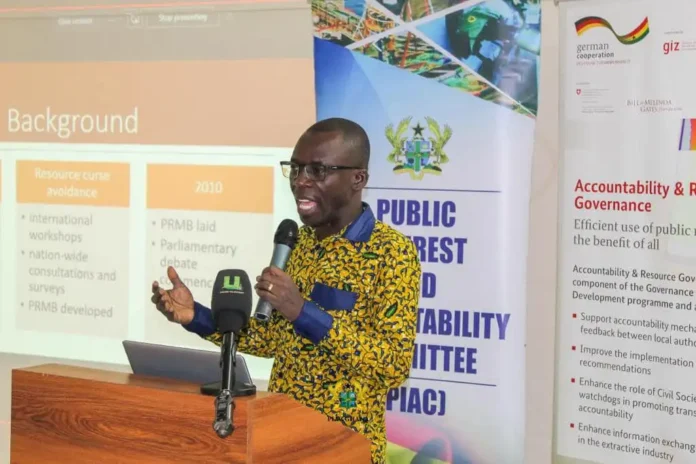The Public Interest and Accountability Committee (PIAC) has urged government to convene a national stakeholder dialogue on the recent amendments to the Petroleum Revenue Management Act (PRMA), 2011 (Act 815), warning that the changes could have long-term implications for transparency and equitable management of Ghana’s oil wealth.
Addressing a virtual media engagement on PIAC’s 2025 Semi-Annual Report in Accra last Wednesday, the Committee’s Coordinator, Isaac Dwamena, said the 2025 PRMA amendments—though aimed at strengthening infrastructure delivery, were passed without adequate consultation with Parliament, civil society, and local authorities.
Under the new provision, the Annual Budget Funding Amount (ABFA) is now to be used exclusively for infrastructure development, replacing the previous system where petroleum revenues were shared among several “priority areas” such as education, health, and agriculture.
“According to the Ministry of Finance, this shift is meant to channel oil funds into tangible, long-term assets that can drive growth,” Mr. Dwamena said. “However, a narrow focus on infrastructure could sideline other critical sectors that directly impact citizens’ welfare.”
He emphasised that petroleum revenues belong to all Ghanaians and must be managed through an open and participatory process.
“Decisions on the use of our oil wealth must reflect a broad national consensus, not a single spending priority,” he said
Funding and Oversight Concerns
Mr. Dwamena also raised concerns about the repeal of Section 57(3) of the Act, which previously guaranteed direct funding from the ABFA to PIAC. The change, he noted, could compromise the Committee’s independence and oversight role, as its operations will now depend on the discretion of the Ministry of Finance.
Before the amendment, PIAC received about 31% of its annual budget from the Ministry; this rose to 85.5% after its funding was tied to the ABFA. With the repeal, he warned, predictable financing for monitoring and public education could be lost.
“Without secure funding, our ability to ensure transparency in petroleum revenue use will be severely constrained,” he stated.
Call for Balance, Inclusion
PIAC, Mr. Dwamena clarified, is not opposing the amendment in principle but is calling for a more balanced approach that safeguards oversight institutions and maintains social investments alongside infrastructure.
He urged Parliament to revisit the amendments to correct inconsistencies and establish clear implementation guidelines that prevent the misuse of oil funds.
“Our petroleum resources are finite,” he cautioned. “We must ensure that the laws governing their use remain transparent, inclusive, and aligned with Ghana’s long-term development goals.”



